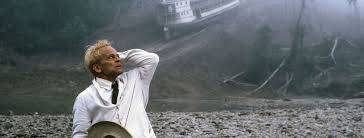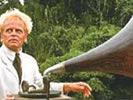Eye For Film >> Movies >> Fitzcarraldo (1982) Film Review

Fitzcarraldo is a highly regarded piece of cinema. With critics consistently singing Werner Herzog's praises, writing a wholly objective review about one of his best known films is tricky.
However, I refuse to be deterred. Rising to a challenge is something that the director, protagonist and I have in common.

Set in South America at the turn of the 19th century, the film focuses on Don Fitzgerald - Fitzcarraldo, to his friends - and his attempt to bring opera to the jungle. He needs, and it seems that his life depends on it, to find funds to build an opera house and decides that getting to an untapped rubber forest by hauling a boat over a mountain is the only way of doing this.
The narrative meanders like an Amazonian river, making it difficult to understand what is going on. Fitz embarks on a number of schemes to raise money, is thrown into jail, plays a lot of Caruso on his gramophone and lounges in a bed surrounded by children, before he hits on the idea of chartering a boat to find his forest.
Klaus Kinski portrays Fitz's borderline insanity perfectly, but his claim to bonefide lunacy is somewhat undermined by Herzog's decision to surround him with substantially crazier characters. A blind skipper, promiscuous cook and a mechanic with a penchant for dynamite put Fitz's music-inspired madness into perspective.
His operatic infatuation seems to have its uses. Once on their way and deep up river, he bewitches hostile natives with an aria, so that they will lend a hand and help him drag the boat over the mountain.
Things only come to life when the construction work begins. Herzog's production values mirror the narrative's core premise: the power of dreams. Where Fitz is obsessed with building his opera house and will do anything to make it a reality, Herzog was obsessed with reality itself. When shooting the film, he refused to use models, or special effects. When you see the jungle tribesmen hauling a ship over a mountain, they really are hauling a ship over a mountain. Bearing this in mind, it makes the film doubly interesting to watch, more as documentary than a plot-driven adventure yarn.
The narrative does serve some purpose, however. Herzog passes interesting comment on the colonial/native divide, the rubber barons being uncultured swine, with money to burn - or eaten by fish, as it turns out - while the impoverished Indians, and even the hogs, appreciate good music. Inspired cinematography adds to the film's finer points. With beautiful shots of the unspoilt Amazonian jungle and clever camera angles, you are taken as close to the hard graft as possible and can almost smell the sweat.
On the downside, the limited use of a musical score does the film no favours. It's easy to lose interest when the pace is slow and you are left trying to address the balance between boredom and absurdity. I want the boat to hurry up and get there, while simultaneously attempting to understand what an insane Aryan, a blind skipper and a drunk cook are doing on this boat in the first place.
For a director obsessed with "the real", Herzog's script begs for a dose of plausibility. That aside, if you like dramatic scenery and feats of extreme engineering, you should definitely watch it.
Alternatively, there's always the Discovery Channel.
Reviewed on: 20 Mar 2004


















